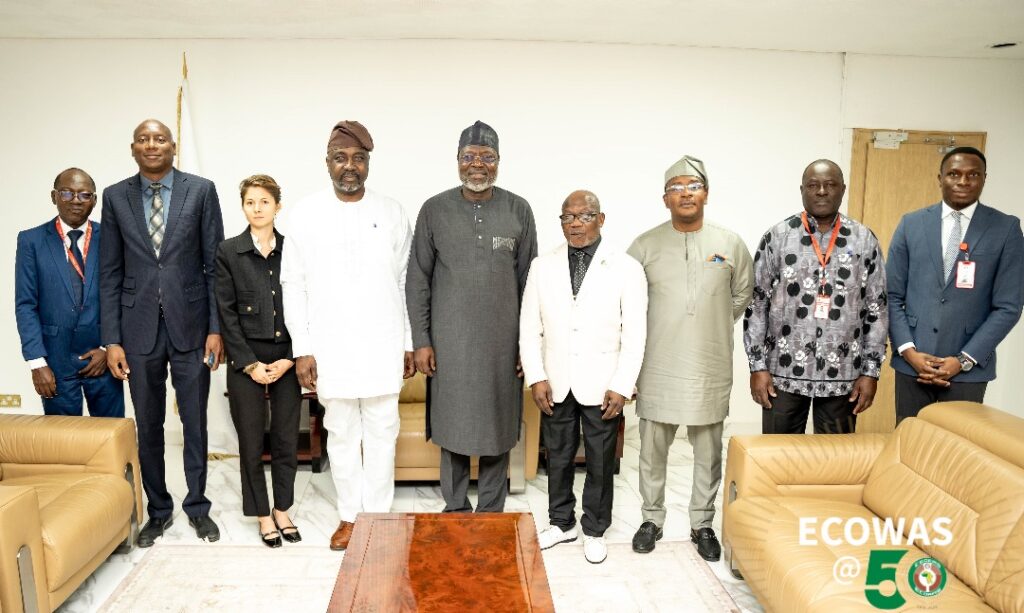ECOWAS and UN Forge New Approach on Addressing Disarmament, As UN Deputy Chief, Adedeji Ebo Leads High-Level Push for Safer West Africa.
By Raymond Enoch
In a powerful show of international solidarity and regional resolve, Mr. Adedeji Ebo, Director and Deputy to the High Representative for Disarmament Affairs at the United Nations Office for Disarmament Affairs (UNODA), concluded a high-stakes three-day visit to the headquarters of the Economic Community of West African States (ECOWAS) in Abuja this week. The visit, which ran from August 5th to 7th, marked a pivotal moment in West Africa’s ongoing struggle against the proliferation of small arms, illicit weapons trafficking, and the mounting threats of emerging technologies in conflict zones.

Mr. Ebo’s mission was clear: deepen strategic ties between UNODA and ECOWAS, breathe new life into a 15-year-old memorandum of understanding, and lead a joint call to action against evolving security threats destabilizing the region
The UNODA delegation and ECOWAS officials used the high-level engagement to initiate a comprehensive update to their 2009 Memorandum of Understanding—a landmark agreement aimed at regional disarmament cooperation. With the security landscape having dramatically shifted since then, both parties agreed the framework must now contend with 21st-century threats such as autonomous weapons systems, improvised explosive devices (IEDs), arms smuggling networks, and the unchecked spread of emerging technologies that are increasingly exploited by armed groups and non-state actors.
“Security threats in West Africa have taken on a new dimension, and our response must evolve just as quickly,” Mr. Ebo said during the bilateral sessions. “This partnership with ECOWAS is critical to adapting our policies to the rapidly changing realities66 on the ground.”
A key highlight of the visit was the jointly organized regional workshop on gender mainstreaming in small arms control—an often-overlooked but critical area of security reform. Bringing together experts, policymakers, and civil society representatives, the workshop emphasized the importance of integrating gender-sensitive approaches in disarmament strategies, particularly in a region where women and children disproportionately suffer the impacts of armed violence.
“Gender perspectives are no longer optional—they are essential to effective arms control and long-term peacebuilding,” Mr. Ebo stressed.
In a joint communiqué issued at the conclusion of the visit, ECOWAS and UNODA reaffirmed their shared commitment to the full implementation of the ECOWAS Convention on Small Arms and Light Weapons. The convention, originally signed in 2006, is now poised for revision to better reflect the shifting dynamics of regional conflict and the tools used to wage it.
The revision, officials noted, will align the convention with broader peacebuilding and development frameworks, ensuring that disarmament efforts are not just reactive, but proactive in fostering sustainable peace and socio-economic growth.
ECOWAS leadership hailed the visit as a timely and strategic turning point for the region.
“This collaboration signals a new era in West African security governance,” an ECOWAS senior official said. “Together with UNODA and through its regional office UNREC, we are setting the stage for smarter, more inclusive, and more responsive disarmament policies.”
As the world grapples with the nexus between arms proliferation, terrorism, and technology, West Africa’s renewed partnership with the United Nations serves as a blueprint for other regions facing similar crises. With Mr. Ebo’s visit serving as a catalyst, both organizations have signaled a readiness to think beyond traditional disarmament paradigms—and act swiftly.
In the weeks ahead, technical working groups are expected to begin drafting the revised MOU and legal frameworks, while continuing cross-border consultations will inform a holistic regional strategy.
As Abuja’s skies return to their usual quiet hum after the flurry of high-level meetings, one thing is clear: disarmament in West Africa is no longer just a security imperative—it is a political, gendered, and developmental priority. And with international backing, ECOWAS appears ready to lead the charge.










